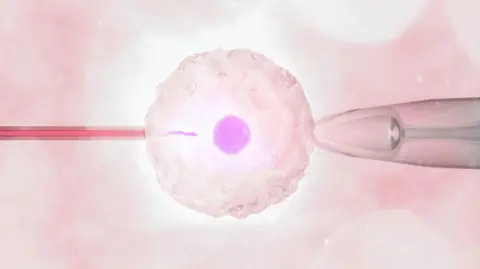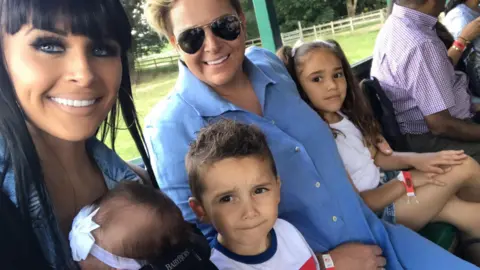
[ad_1]
 Getty Images
Getty ImagesThe number of single women and female couples undergoing IVF or artificial insemination in the UK has risen over the past decade, a report from the fertility regulator shows.
The number of single women having treatment, including in-vitro fertilisation (IVF), has increased from 1,400 in 2012 to 4,800 in 2022, while the number of female couples treated has doubled to 3,300 over the same period.
Heterosexual couples still account for nearly 90% of all IVF treatments.
A fertility charity said many female couples and single women still faced enormous financial hurdles to prove their infertility before being able to access NHS-funded IVF.
Growing numbers of different family groups are seeking fertility treatment.
Heterosexual couples had 47,000 IVF or donor insemination (DI) treatments in 2022, up from 45,300 in 2012.
But one in six of all private and NHS fertility treatments in the UK is now accessed by single women and female same-sex couples, according to The Human and Fertilisation Embryology Authority (HFEA) report.
 Laura-Rose Thorogood
Laura-Rose ThorogoodLaura-Rose Thorogood and her female partner have spent £50-60,000 on having their four children, over the past 13 years.
“It’s been a tumultuous journey – we knew we had to pay for it ourselves and we’ve had to sacrifice lots of things to do it,” she says.
Laura-Rose says they feel very lucky to have more than one child and know many other LGBT couples who had to stop trying for children because of the cost.
She set up LGBT Mummies, an organisation which gives advice to people on becoming parents and campaigns for equal access to fertility treatment.
“The whole system needs to be reviewed,” she adds.
Many heterosexual couples also describe the challenges of multiple rounds of IVF and the rollercoaster of emotions going through years of treatment.
‘Expensive treatments’
NHS funding for fertility treatment continues to fall.
It now pays for just 27% of IVF cycles, down from 40% in 2012.
Among 18-39 year olds having their first treatment, heterosexual couples receive 52% of NHS-funded cycles, with female couples accounting for 16% and single women 18% – both a slight rise.
The HFEA report says IVF is “one of the most invasive and expensive treatments per cycle”.
But more female couples and single women are choosing it, for several reasons, including the:
- higher birth rates per cycle
- reduced risk of a twin pregnancy
- possibility of storing embryos for future treatments
Reciprocal IVF, where one partner provides the eggs (to be fertilised by donor sperm) and the other carries the baby, is also becoming more popular.
Overall, one in four IVF treatments resulted in a birth, the report found.
IVF birth rates are higher among single women and female couples, who are less likely than heterosexual couples to be having the treatment because of infertility problems – and who may also be waiting for other treatment.
The chances of qualifying for NHS funding depends on where the patients live.
In England, NHS funding depends on criteria set by local integrated-care boards, which vary widely – whereas in Scotland, Wales and Northern Ireland, there is a national policy.
In Scotland, 78% of IVF cycles are NHS funded, compared with 53% in Wales and 45% in England.
But, currently, Scotland does not fund fertility treatment for single women.
‘Urgent change’
The previous government said it would remove barriers to treatment for female couples in England, who, in most areas, have to pay for at least six cycles of artificial insemination before being accepted for NHS-funded IVF.
But the charity Fertility Network UK said: “This has not yet happened, leaving female same-sex couples and single women who want to become parents having to pay, if they are able to, for their own medical treatment.”
Stonewall, which advocates for the rights of LGBTQ+ people, said urgent change was needed so everyone who wanted children had the same access to services
The HFEA said it encouraged healthcare providers “to make sure the information they provide represents the diversity of families and patients accessing treatment”.
An official from the Department of Health and Social Care in England said: “There are clear clinical guidelines making sure there is equal access across the country and we fully expect these to be followed.”
[ad_2]
Source link
